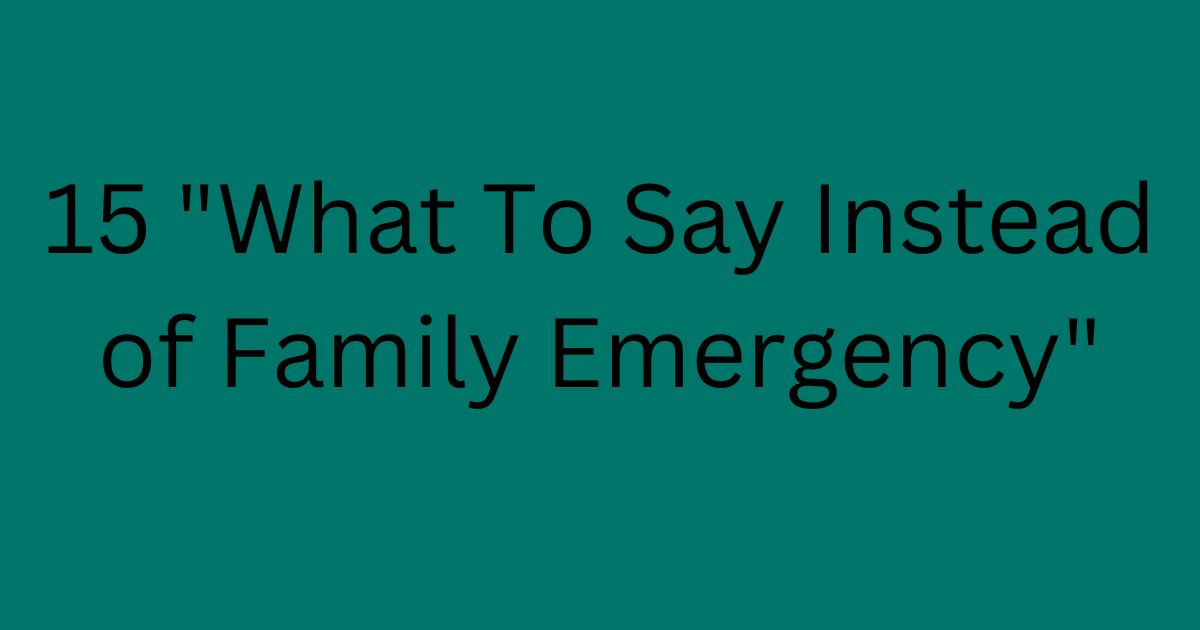A “family emergency” is an urgent situation involving a family member that requires immediate attention. It can be anything from a health crisis to a serious personal matter. These situations often need quick responses.
When faced with a family emergency, finding the right words can be hard. You may want to explain the urgency without sharing too much. Using clear and respectful phrases helps you communicate better.
There are many alternative ways to say “family emergency.” Phrases like “urgent family matter” or “serious family issue” keep things professional. These alternatives allow you to stay discreet while sharing the importance of your situation.
Synonyms for “Family Emergency”
When life throws a curveball, having a repertoire of phrases at your disposal can be a game-changer. These alternatives to “family emergency” offer nuanced ways to communicate the gravity of your situation without oversharing or alarming others unnecessarily. From “urgent family matter” to “family priority,” each phrase carries its own weight and implications, allowing you to choose the most appropriate term for your specific circumstances.
In professional settings, you might opt for more formal language, while personal situations might call for a softer touch. Remember, the goal is to convey the importance of your family situation while maintaining privacy and respect for all involved.Here is some alternative ways to say “Family Emergency”
- Urgent Family Matter
- Critical Family Situation
- Family Crisis
- Immediate Family Concern
- Serious Family Issue
- Family Health Emergency
- Unexpected Family Problem
- Family Urgency
- Immediate Family Situation
- Family-related Emergency
- Sudden Family Issue
- Family Priority
- Trouble at home
- Problems at home
- Family matter of importance
1. Urgent Family Matter
When you’re faced with a pressing family issue that demands immediate attention, “urgent family matter” is a go-to phrase. This alternative strikes a balance between conveying the seriousness of the situation and maintaining a level of privacy. It’s particularly useful in professional settings where you need to explain a sudden absence or request for time off.
For example,
You might say, “I apologize for the short notice, but an urgent family matter has come up, and I need to leave the office immediately.”
This phrase signals the importance of the situation without inviting unnecessary questions or concern. It’s a diplomatic way to communicate that your family needs you, while still respecting workplace boundaries.
2. Critical Family Situation
Sometimes, you need a phrase that carries more weight than “urgent.” That’s where “critical family situation” comes in handy. This alternative implies a heightened level of seriousness and can be used when you’re dealing with a major family crisis that requires your full attention and possibly an extended absence.
For Example
In a work context, you might use it like this: “I’m dealing with a critical family situation and may need to take some time off. I’ll keep you updated on my return date.”
This phrase communicates the gravity of your circumstances while signaling that you’re still mindful of your professional responsibilities. It’s a balanced approach that most employers and colleagues will understand and respect.
3. Family Crisis
When you’re facing a severe family issue that demands immediate and intense focus, “family crisis” is an appropriate term. This phrase clearly communicates the urgency and seriousness of your situation without divulging specific details. It’s a straightforward way to express that you’re dealing with a significant family problem that requires your full attention.
For Example
Using this term might sound like: “I’m in the middle of a family crisis and won’t be able to attend the meeting today. I’ll catch up on any missed information as soon as I can.”
This approach conveys the gravity of your situation while also showing your commitment to your responsibilities. It’s a direct yet respectful way to communicate your need for time and understanding.
4. Immediate Family Concern
“Immediate family concern” is a phrase that strikes a balance between urgency and discretion. It suggests that the issue involves close family members without specifying who or what the problem might be. This alternative is particularly useful when you need to convey the personal nature of the situation without inviting too many questions.
For Example
You might use it in a message to a colleague or friend: “An immediate family concern has come up, and I need to step away for a bit. I appreciate your understanding during this time.”
This phrasing acknowledges the importance of your family matter while maintaining appropriate boundaries. It’s a tactful way to communicate your need for time and space.
5. Serious Family Issue
When you’re dealing with a significant family problem that may require more than just a quick absence, “serious family issue” can be an appropriate phrase to use. This alternative conveys the gravity of the situation without being alarmist. It’s a good choice when you need to communicate that you’re dealing with something substantial that may impact your availability or focus for a while.
For Example
You could say, “I’m currently managing a serious family issue and may need to adjust my schedule in the coming weeks.”
This approach signals that while you’re dealing with something important, you’re also trying to balance your responsibilities. It’s a thoughtful way to keep others informed while maintaining your privacy.
6. Family Health Emergency
When a health crisis strikes your family, “family health emergency” is a clear and appropriate term to use. This phrase immediately communicates the nature of the situation without divulging specific medical details. It’s particularly useful when you need to explain a sudden absence or request for leave, especially in professional settings.
For Example
You might use it like this: “I need to take some time off due to a family health emergency. I’ll update you on my return date as soon as I can.”
This phrasing respects medical privacy while clearly conveying the urgency of your situation. It’s a sensitive way to communicate about health issues affecting your family.
7. Unexpected Family Problem
Life is full of surprises, and not all of them are pleasant. When you’re blindsided by a family issue, “unexpected family problem” can be a useful phrase. This alternative communicates both the suddenness and the seriousness of your situation, helping others understand why you might need to change plans or take time off at short notice.
For example
“An unexpected family problem has come up, and I need to head home right away. I’ll do my best to catch up on any missed work later.”
This approach acknowledges the unplanned nature of your situation while showing your commitment to your responsibilities. It’s a balanced way to communicate about sudden family issues.
8. Family Urgency
“Family urgency” is a versatile phrase that can cover a wide range of situations. It conveys the pressing nature of your family matter without specifying details. This alternative is particularly useful when you need to communicate quickly and don’t have time for lengthy explanations.
For Example
You might use it in a quick message: “Dealing with a family urgency. Need to step out. Will update later.”
This concise approach gets the point across efficiently, which can be crucial in time-sensitive situations. It’s a direct way to communicate your need to prioritize a family matter immediately.
9. Immediate Family Situation
When you need to convey that something significant is happening within your closest family circle, “immediate family situation” is a good choice. This phrase suggests that the matter involves parents, siblings, or children, without specifying who or what the issue might be. It’s a way to communicate the personal nature of your circumstances while maintaining privacy.
For Example
“I’m dealing with an immediate family situation and may be hard to reach for the next few days.” This phrasing lets others know that you’re focused on a family matter without inviting unnecessary questions. It’s a respectful way to set boundaries while keeping relevant parties informed.
10. Family-related Emergency
“Family-related emergency” is a broad term that can cover a wide range of urgent situations. This phrase is useful when you need to communicate that you’re dealing with a pressing family issue without specifying the nature of the emergency. It’s particularly helpful in professional settings where you want to maintain a degree of privacy.
For Example
You could use it like this: “I need to take some personal time due to a family-related emergency. I’ll be back in the office as soon as possible.”
This approach clearly communicates the urgency of your situation while keeping the details private. It’s a professional way to handle personal matters in a work context.
11. Sudden Family Issue
When a family problem crops up out of the blue, “sudden family issue” can be an effective phrase to use. This alternative emphasizes the unexpected nature of the situation, helping others understand why you might need to change plans or leave abruptly. It’s a good choice when you want to convey both the urgency and the unplanned aspect of your family matter.
For example
“A sudden family issue has come up, and I need to leave immediately. I’ll follow up on our discussion as soon as I can.”
This phrasing acknowledges the abrupt nature of your departure while showing your intention to follow through on your commitments. It’s a considerate way to handle unexpected family situations.
12. Family Priority
Sometimes, you need to convey that a family matter takes precedence without necessarily implying an emergency. That’s where “family priority” comes in handy. This phrase suggests that while your family situation is important and needs your attention, it may not be a crisis. It’s a good choice when you need to focus on family matters that are significant but not necessarily urgent.
For Example
You might use it like this: “I have a family priority to attend to this afternoon, so I’ll need to leave early.”
This approach communicates the importance of your family matter without raising undue alarm. It’s a balanced way to prioritize family needs while maintaining professional commitments.
13.Trouble at home
Sometimes, “trouble at home” is the best way to express an ongoing issue without diving into specifics. Maybe your child suddenly got sick, or a plumbing disaster decided to strike right before a big meeting. This phrase offers a flexible yet personal touch. It subtly conveys that you’re dealing with something significant that requires your immediate attention. Rather than sounding alarmist, it leaves room for understanding while keeping the details private
For example
Imagine you’re about to miss an important meeting. You might say, “I’ve got some trouble at home and need to take care of it.”
It tells the other person that you’re dealing with something serious without oversharing. It could be a family emergency, a broken water pipe, or something else entirely but the phrase covers it all while maintaining your privacy.
14.Problems at home
“Problems at home” is a versatile phrase that can cover a range of family-related issues. Imagine you’re juggling work deadlines and suddenly, your teenager calls about a broken window or a heated argument. That’s a clear example of a “problem at home.” It signals something serious but doesn’t always mean an emergency. Maybe your partner isn’t feeling well, or a repair needs immediate attention. This phrase works perfectly when you need to excuse yourself without sharing too much detail but still emphasize the need for your attention.
For Example
If your child is struggling with a school problem, or a plumbing disaster strikes, saying “I have some problems at home” signals urgency without overdramatizing the situation.
It’s both neutral and flexible.You’d use this phrase when the issue isn’t life-threatening, but it’s enough to disrupt your day.
15.Family matter of importance
A “family matter of importance” signals that something critical requires your attention at home, without the intensity of an emergency. Imagine you’re about to leave for a big work presentation, and suddenly, your sibling calls to let you know they’ve been in a minor accident. They’re not severely hurt, but they need help with their kids for the day. In this case, you’d say, “I need to take care of a family matter of importance,” which clearly communicates the seriousness of the situation, without causing panic or implying it’s life-threatening.
For Example
If you’re in a meeting and receive an unexpected message about a family-related issue, you could politely say, “I have a family matter of importance that requires my immediate attention.” .
This phrase works well when you need to step away from professional obligations without oversharing or alarming others.This phrase strikes a balance between urgency and discretion, making it ideal for both formal and casual settings.
Conclusion
Having alternative ways to express a family emergency can help ensure your message is understood in various contexts while maintaining professionalism and respect for privacy. Whether you’re facing a sudden health issue or an unexpected problem, choosing the right phrase can make communication smoother and more effective. These alternatives allow for flexibility in tone, giving you the ability to tailor your language to fit the situation at hand.
FAQ’s
1. What are some professional ways to say “family emergency”?
You can use terms like “urgent family matter” or “critical family situation” to maintain a professional tone while conveying urgency.
2. How can I communicate a family emergency without giving too many details?
Phrases like “immediate family concern” or “family matter of importance” are great options to convey seriousness without oversharing.
3. What’s a respectful way to inform my boss of a family emergency?
Try saying “I need to attend to a serious family issue” to keep the communication respectful and clear.
4. Can I use alternative phrases for family emergency in emails?
Yes, alternatives like “unexpected family problem” or “family health emergency” work well in written communication, especially in professional emails.
5. When should I use “family priority” instead of “family emergency”?
“Family priority” is best when dealing with important family matters that aren’t emergencies but still require immediate attention.
Also Read
30 Heartfelt Ways to Say “Thank You for Your Support”
20 Other Ways to Say “Happy Sabbath” (With Examples)
25 Other Ways to Say “Thank You for Clarifying”
30 “I am sorry to hear that” Professional Way











